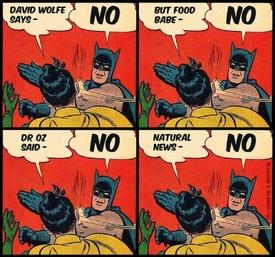Organic? Genetically modified food?
Replies
-
Origin of hardy wheat. Without it farms around here would not have made it.
http://www.agr.gc.ca/eng/news/scientific-achievements-in-agriculture/from-a-single-seed-tracing-the-marquis-wheat-success-story-in-canada-to-its-roots-in-ukraine-4of11/?id=11813051783502 -
This content has been removed.
-
Woah, reading back, I missed this glaring error:studies that showed rats fed GMO corn developed tumours and died younger than rats fed non GMO corn.
You can't really be oblivious to the huge scientific coverage of that rat study that got it blasted to smithereens.
Do you get all your resources from the charlatans March Against Monsanto, Food Babe, Natural News, and David Avocado Wolfe?
6 -
domeofstars wrote: »Are you happy to pay more for organic food?
Do you avoid foods that are genetically modified?
Why?
No, I do not pay more for organic food. I do not avoid genetically modified foods. I have a tight budget. I buy food that fits my budget.
Good answer. Thank you.1 -
domeofstars wrote: »Are you happy to pay more for organic food?
Do you avoid foods that are genetically modified?
Why?
I'm not in the US, and I found a place that sold imported American foods. I was amazed at how many foods had genetically modified ingredients in them. I have family in the US and they pretty much buy organic all the time but they are rich...
We actively avoid Organic and "Non GMO" foods in our household (opposite of a lot of people.. I know). One reason for this is the fear mongering and non scientific community attacking scientists who come out in defense of non organic food. Organic and non GMO is a marketing ploy (the organic industry is worth 4 billion in the US annually), and does not denote a product is healthier.
https://med.stanford.edu/news/all-news/2012/09/little-evidence-of-health-benefits-from-organic-foods-study-finds.html
http://www.health.harvard.edu/blog/organic-food-no-more-nutritious-than-conventionally-grown-food-201209055264
http://www.businessinsider.com/economist-organic-foods-just-marketing-2012-9
Also- humans have literally been modifying food since we figured out we could do so thousands of years ago. Ever ate an almond? You can thank your ancestors for taking a poisonous plant and breeding the arsenic down for safe levels of consumption for that tasty nut.
https://en.wikipedia.org/wiki/Almond
https://www.geneticliteracyproject.org/2016/10/10/non-gmo-month-marketing-ploy-grounded-misinformation/
One of the biggest reasons we don't support the organic industry though is our personal beliefs and morals. Farming organic takes up more space then conventional farming. With a growing global population we already cant feed, supporting the growth of an industry that restricts the amount of food we can grow and wants to disband research into new crop techniques that could help grow crops in areas with less water (ie during drought), have resistance to bugs (less pesticide), and more nutrients (golden rice is a prime example of this). We don't feel right giving our money to these companies.
This is my thoughts exactly.1 -
n1cholee93 wrote: »crzycatlady1 wrote: »n1cholee93 wrote: »Yes i buy organic. Especially fruits and vegetables. We do have our own garden and don't tend to use pesticides unless we have to.
And yes i read labels, and stay away from modified anything if i can.
Why? Because i care about my health. I'm trying to lose weight, which means i'm trying to overall be healthier. And that translates to me eating food that doesn't destroy my health. Plus organic tends to taste better...
I understand most people think the "organic" is a ploy, and it is to a certain extent. But organic means what we're eating is more natural. Organic meat = animals (cows) need to be on a rotation. Meaning the animals aren't sat in a padlock all their lives. Ever notice the seal for animal welfare on most organic products? I look for those above all else, personally.
I also lost the extra weight because I care about my health (I needed to normalize a high glucose number), and the modified/non-organic food I eat doesn't 'destroy' my health- I'm actually in excellent health now and have consistent good feedback from my doctor/tests.
I'm genuinely curious what you think tastes better organic? I've had organic products before and I've never tasted a difference. I do notice a color/size difference with the free range eggs I get, (from a relative who raises chickens as a hobby), but they taste the same as the ones I occasionally buy at the store.
Cereal is something i think taste better. The "simply" ones are something i find yummy. Hot chocolate/syrup. The milk, but i buy that locally and it has a rich taste, not bland. My eggs are better, you can see the difference.
I find it so funny with all the hate, though. You guys either must not do research or really live in a hole. Organic where i came from was just "food". But whatever floats your boat. You can't deny the chemicals in everyday food. McDonalds even had a FQ on why their food doesn't mold. Or why twinkies are stay good. I personally did my own research and came to the conclusion i didn't want to eat certain foods, i guess "i" deem them as unhealthy, were as a majority here think i'm bat crazy. For my health and environment/animal welfare i don't mind using organic and more "natural" products. I will gracefully bow out now, i didn't imagine my statement would cause this much of an uproar.
Are you aware Twinkies only have a shelf life of 25 days? This is not a long period of time.0 -
I eat organic and non GMO. I don't care whether it's more expensive or cheaper....I have found in some cases the organic counterpart was cheaper than the non organic. Organic farming methods are the most sustainable methods with the most reliable crop yields. Several scientific studies have shown that conventional farming with its chemical fertilisers and pesticides strip the land of nutrients resulting in a constant decline in crop yields. The solution was to just keep adding more and more chemical fertilisers to keep up yields but that is now to the point that crop yields are in decline. It's taken decades for this, but shows it's not sustainable in long run to do conventional farming.
The introduction of the GMO corn and soybean actually resulted in the use of MORE pesticides, not less. The crop yields of GMOs are also no better than crop yields of heirloom plants when looked at long term. Anyone who says different has only read the advertising literature and not the studies done on the sustainability of these crops. Also a recent study found that conflicts of interest DID affect the result of studies into the safety of GMOs and if you looked at the studies without conflicts of interest...the majority of studies showed GMOs to not be safe. This is the reason most GMOs are banned in Europe...because not all GMOs are safe for human consumption. GMOs are not the same as selective breeding because with selective breeding you are staying within the same species. With GMOs, genes from other kingdoms are inserted...i.e. Bacteria genes into plants, animal genes into plants. The science is not sufficiently advanced to predict all the proteins that will be produced as a result of gene insertion and a whole host of these proteins have been found to be toxic and carcinogenic...there is an EU list of these proteins that cannot be present for a GMO to be approved. I don't think it's a coincidence that the US has a higher rate of cancer deaths than Europe despite having similar standard of living...western first world country...as well as a now declining life expectancy whereas Europes life expectancy is still increasing. What has caused this? The only major difference is food supply....particularly the US allowing GMOs and less strict regulations for conventional foods. It also dovetails with studies that showed rats fed GMO corn developed tumours and died younger than rats fed non GMO corn.
One thing is for sure, you don't know a thing about farming.3 -
-
I don't consider genetic modification to be anything other than a tool and as such don't consider so-called "genetically modified foods" (in actuality food products that were derived from plants that were in part produced through genetic engineering) to be inherently dangerous. Fructose sourced from genetically engineered corn is molecularly no different than fructose sourced from "organic" corn so I don't see why I would concern myself with that.
That said I don't actively boycott "Non-GMO" or "Organic" products just because I think its a marketing campaign targeted towards cynicism and unwarranted fear and not based on any actual science or reality.
Instead I tend to buy the foods I like the taste of that fulfill my nutritional needs at a reasonable price. If that day in the store that happens to be something labeled "Non-GMO" I buy it anyways.
I try not to make my trips to the grocery store into a sociopolitical movement because honestly I can't be bothered.3 -
There is really no such thing as "organic" chicken breast. It's chicken it's natural just the way it is. Free range is the word you're looking for.
Fun fact (1): "Organic"typically is used with products that are free of "pesticides"or added "antibiotics".
Fun fact (2): there is such a thing called organic pesticides.
Fun fact (3): the typical eggs you get from the store are not fertilized. Meaning no baby chicken is in there.
Fun Fact (4): chickens at 6 month old can produce eggs.
Also, a lot of the wording used is just for Marketing. Some Products are naturally "organic" or "gluten free" it's just the market trying to earn an extra dollar. And just because something is organic doesn't mean it's good for you.0 -
I try to eat less GMOs and more organic or just non-GMO.2
-
I don't give a rats *kitten*. I like organic eggs tho. They do taste nice.0
-
Almost all the fruit and vegetables we eat have been genetically modified over the years. There is nothing wrong or unsafe w/ GMO food, so no, I don't avoid it. I also do not eat organic. I would if I could afford to, but I can't.2
-
GMO's feed the world.3
-
2
-
GMO is all very well. One of the substances plants use as protections from moulds and mildews is salicylate. My problem comes because my body is unable to eliminate salicylate which is normally in foods fruits, veg, mushrooms that's a quirky one, so I need to avoid many normally eaten foods to feel partly well. The number of us with this problem is increasing.
As for any meat. I chose not to eat it. If I were to, I would need to know it was not treated with antibiotics. I was once very ill and the only reason I can think of is, the meat I had eaten when I was out had been treated with antibiotics too close to being dispatched so it had not worked its way through the animals system before it activated my known antibiotic reactions. Using Organic products greatly reduces the risks of contamination. The best way to be safe is for me to avoid.
Animals in general agriculture have no say in if they have antibiotics or not, many farming practices use antibiotics as a means to avoid problems in the herd rather than go for higher care standards.
Each to their own.0 -
GMO is all very well. One of the substances plants use as protections from moulds and mildews is salicylate. My problem comes because my body is unable to eliminate salicylate which is normally in foods fruits, veg, mushrooms that's a quirky one, so I need to avoid many normally eaten foods to feel partly well. The number of us with this problem is increasing.
As for any meat. I chose not to eat it. If I were to, I would need to know it was not treated with antibiotics. I was once very ill and the only reason I can think of is, the meat I had eaten when I was out had been treated with antibiotics too close to being dispatched so it had not worked its way through the animals system before it activated my known antibiotic reactions. Using Organic products greatly reduces the risks of contamination. The best way to be safe is for me to avoid.
Animals in general agriculture have no say in if they have antibiotics or not, many farming practices use antibiotics as a means to avoid problems in the herd rather than go for higher care standards.
Each to their own.
Or whoever was handling the meat didn't do it well and it became contaminated with bacteria that made you ill.
If a farm/processor was caught with antibiotics in the meat they would be subject to fines or even closure of their operations.1 -
There is no evidence to support that organic, clean, non-GMO, insert trendy term here...is any better or worse for you. If you find a product and it tastes better...eat that one.1
-
I avoid most processed, packaged, prepared meal type foods as a rule which means I avoid all the artificial colours, flavours, additives, preservatives and unpronouncable chemical compounds contained in many packaged meals or dishes. I prefer my own cooking to slop made on an assembly line anyway. I don't eat soy at all and corn only the sweet varieties in the summer when it's in season. They are two of the most GMO'd crops AFAIK. I sourced out a couple of organic/free range meat sources and buy all my beef, eggs, duck, liver etc. from there. The price is easily comparable to the local grocery store for non-organic meat/dairy but of course you have to drive the 10 minutes into the country to the farm to get it. I find some things do taste better, like the eggs always taste smoother and creamier, but being freshly laid might have a lot to do with it. I grow some of my own food as well, completely organic. Greens, tomatoes, peppers, beans, all kinds of herbs etc. I like to buy local when in season because it's cheaper and plentiful. I prefer the organic stuff but I'll still buy non-organic although I'm sure many of the things are GMO to some degree.0
-
Sorry to those who think differently. The symptoms I experienced then exactly mirrored the ones I experienced earlier. Others in the party who ate the same meal did not have my problems. thank you.0
-
I will agree that the meats taste better, but I only buy organic if its the same price/size. Or if its a product thats only available in non GMO organic. Otherwise it doesn't bother me.0
This discussion has been closed.
Categories
- All Categories
- 1.4M Health, Wellness and Goals
- 397K Introduce Yourself
- 44.2K Getting Started
- 260.9K Health and Weight Loss
- 176.3K Food and Nutrition
- 47.6K Recipes
- 232.8K Fitness and Exercise
- 456 Sleep, Mindfulness and Overall Wellness
- 6.5K Goal: Maintaining Weight
- 8.7K Goal: Gaining Weight and Body Building
- 153.3K Motivation and Support
- 8.3K Challenges
- 1.3K Debate Club
- 96.5K Chit-Chat
- 2.6K Fun and Games
- 4.6K MyFitnessPal Information
- 16 News and Announcements
- 18 MyFitnessPal Academy
- 1.4K Feature Suggestions and Ideas
- 3.1K MyFitnessPal Tech Support Questions
















